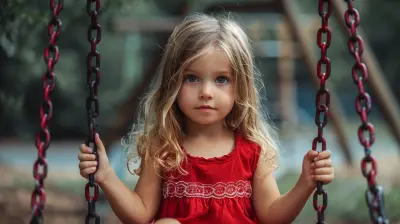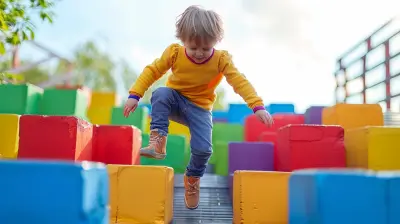Raising a Self-Aware Child: Tips for Emotional Understanding
3 January 2025
In today’s fast-paced world, where emotions can often seem like a whirlwind, raising a self-aware child feels like teaching them how to build a sturdy emotional boat. It's not just about surviving the storm; it's about recognizing when it's coming and preparing for it. In fact, emotional intelligence is an essential life skill that helps children become empathetic, resilient, and well-rounded individuals. But how do we, as parents, nurture that self-awareness in a child?
In this article, we’ll dive into the heart of raising a self-aware child, offering practical tips that can help teach emotional understanding. Spoiler alert: it’s not as complicated as it sounds, and no, you don’t need a degree in psychology to get started. All you need is a little patience and the willingness to embark on this emotional journey with your child.
Let’s get started!

What Does It Mean to Be Self-Aware?
Before we discuss how to raise a self-aware child, let's first unpack what "self-awareness" actually means. At its core, self-awareness is the ability to recognize and understand one's own emotions, thoughts, and behaviors—and more importantly, how they affect others. Think about it: How many times have you wished people around you could just notice how their words or actions impacted the room? That’s self-awareness in a nutshell.For children, self-awareness means being able to identify when they’re feeling happy, sad, frustrated, or scared, and having the tools necessary to communicate those feelings. It’s about helping them realize that their feelings aren’t good or bad—they just are.
Why Is Emotional Self-Awareness Important?
Self-awareness is like the foundation of a house. Without it, everything else crumbles. Emotionally intelligent kids are better at managing stress, solving problems, and navigating social situations. Plus, with early emotional skills in place, they will likely become emotionally aware adults—something our society could use more of, right?Not only does a self-aware child understand themselves better, but they also develop the ability to empathize with others. They begin to realize that others have feelings too, and that their behavior can impact the people around them. It’s a win-win for parents and society alike.

How to Raise a Self-Aware Child: Practical Tips
So, how can you teach your child to be more aware of their emotions? Easy. It starts with you, the parent. Let’s look at some actionable ways you can start building your child's emotional understanding today, without needing to turn your home into an emotional boot camp.1. Model Emotional Awareness
Children are always watching, even when you think they aren’t. They mimic behaviors, especially those of their parents. That’s why one of the best ways to raise a self-aware child is to model emotional awareness yourself.Let your child see how you handle your own emotions. If you’re feeling frustrated after a long day of work, say something like, “I’m feeling a little frustrated right now. I think I need to take a few deep breaths.” This normalizes emotions and shows your child that feelings aren’t meant to be bottled up—they’re meant to be experienced and managed.
Also, don't be afraid to apologize when you’re wrong. If you lose your temper, it’s important to explain later why that happened and how you could have handled it better. This shows kids that it’s okay to make mistakes, as long as you learn from them.
2. Teach Emotional Vocabulary
One of the biggest reasons children struggle with emotional awareness is because they often don’t have the vocabulary to express how they’re feeling. Think of it like trying to tell someone you're cold without knowing the word "cold." Frustrating, right?Start by teaching your child the names for different emotions. Begin with the basics: happy, sad, angry, and scared. As they grow older, begin introducing more nuanced emotions like frustration, jealousy, pride, anxiety, and excitement.
You can make this learning process fun! Use books, emotional flashcards, or even movies where characters clearly express different emotions. Pause a scene and ask, “How do you think that character feels right now?” It creates an interactive learning environment and gives a deeper understanding of emotions.
3. Create a Safe Space for Emotional Expression
Ever notice how some kids just bottle up their emotions until they explode? That’s often because they don’t feel safe expressing their feelings, or they’re scared their emotions will lead to consequences or judgment.To raise a self-aware child, you need to create a space where they can express their emotions freely—without fear of being judged or punished. This doesn’t mean letting tantrums go unchecked, but it does mean avoiding phrases like, “Stop crying!” or “You’re overreacting.”
Instead, you might say, “I can see you’re very upset. It’s okay to feel that way. Want to talk about it?” This reassures the child that it’s okay to have big emotions and that you’re there to help them navigate through those feelings. Remember, emotions are valid, but behaviors may need adjusting.
4. Practice Mindfulness
Mindfulness might sound like something reserved for adults in yoga class, but it’s actually an invaluable skill for kids, too. Teaching children mindfulness isn’t about meditation per se; it’s about helping them stay aware of the present moment without letting their emotions control them.A simple technique to teach mindfulness is by encouraging your child to "check in" with their body. Ask, “How are you feeling right now? What’s your body telling you?” This can help them tune into physical sensations like a racing heart or clammy hands, which are often indicators of underlying emotions like anxiety or fear.
Over time, children who are mindful can take a step back from their feelings rather than being swept away by them.
5. Encourage Problem-Solving
Self-awareness goes hand-in-hand with problem-solving. Once your child is aware of how they feel, the next step is helping them navigate those emotions by coming up with a solution. This encourages both emotional intelligence and critical thinking.For example, if your child is frustrated because they can’t figure out a math problem, get them involved in solving the emotional puzzle by asking, “What do you think would make you feel better right now?" or "What can we do to make this easier?” By putting the ball in their court, you’re teaching them that they have the power to control their emotions and not the other way around.
6. Use Storytelling and Role-Playing
Another great way to teach emotional understanding is through storytelling or role-playing. Stories are excellent tools for making abstract emotional concepts more tangible. Reading books that center around different emotions or include characters who experience strong feelings can give kids a way to see emotional situations from the outside.Role-playing, on the other hand, helps them practice dealing with feelings before they occur in real life. By acting out scenarios—like how to respond when someone makes fun of them at school—not only are they becoming more aware of their own potential reactions, but they’re also learning empathy and problem-solving skills.
7. Allow Time for Self-Reflection
Self-awareness isn’t something that happens overnight. Just like adults need time to process their emotions, children do too. Encourage your child to spend some quiet time reflecting on their day. You can make it a bedtime routine to ask them, “What was the best part of your day?” and “What was hard today? How did it make you feel?”This creates a natural habit of self-reflection and introspection, which is crucial for emotional growth. Even writing or drawing how they feel can be incredibly beneficial for older children. Supporting this kind of mindful reflection helps children build lasting self-awareness that will benefit them throughout life.
Encouraging Self-Awareness in the Digital Age
In today’s digital world, children are exposed to so much stimuli that it can be overwhelming, especially when it comes in the form of social media. With constant comparisons and high demands, it can be tough for kids to stay grounded in their own sense of self.As parents, we need to guide them on how to use technology mindfully. Teach them about their emotional responses to things they see online and how to distinguish reality from what’s portrayed on social media. Remind them often that the highlight reels they see online aren’t a full picture of anyone’s emotional journey.
Conclusion
Raising a self-aware child is one of the biggest gifts we can give them. It’s not always easy, but with patience and consistency, it’s certainly possible. By modeling emotional awareness, encouraging problem-solving, creating a safe space for expression, and teaching emotional vocabulary, you’re setting the foundation for your child to become not only emotionally intelligent but also empathetic and resilient.Remember, emotions are like the tides—they come and go. Helping your child navigate those waters will ensure they have the emotional tools they need to sail smoothly through life’s highs and lows.
So, ready to start this emotional journey with your little one?
all images in this post were generated using AI tools
Category:
Emotional DevelopmentAuthor:

Austin Wilcox
Discussion
rate this article
15 comments
Zayne Matthews
Empowering our children with emotional understanding is a gift that lasts a lifetime. By fostering self-awareness, we help them navigate their feelings and build strong connections with others. Remember, every small step you take today lays the foundation for a resilient and empathetic adult tomorrow. Keep shining! 🌟
February 15, 2025 at 3:53 AM

Austin Wilcox
Thank you for highlighting the importance of emotional understanding! Every small effort truly contributes to raising resilient and empathetic individuals. Let's continue to nurture their growth! 🌟
Sophia McGhee
Great insights! Promoting emotional understanding is essential for healthy development.
February 2, 2025 at 3:24 PM

Austin Wilcox
Thank you! I completely agree—emotional understanding is key to fostering a child's healthy development.
Gianna Bellamy
Wonderful insights! Love these tips for nurturing self-awareness in kids!
January 30, 2025 at 5:40 AM

Austin Wilcox
Thank you! I'm glad you found the tips helpful for fostering self-awareness in kids!
Gideon McCarty
This article offers valuable insights into nurturing emotional intelligence in children. By fostering self-awareness through open communication, modeling healthy emotions, and encouraging reflection, parents can empower their kids to understand and manage their feelings. A crucial foundation for lifelong emotional well-being!
January 27, 2025 at 4:28 AM

Austin Wilcox
Thank you for your thoughtful comment! I’m glad you found the insights valuable for nurturing emotional intelligence in children.
Lindsey McIntosh
This article offers invaluable insights for parents aiming to nurture emotional intelligence in their children. By encouraging self-reflection and open communication, we can help kids develop essential skills for understanding their feelings and navigating relationships.
January 23, 2025 at 3:57 AM

Austin Wilcox
Thank you for your insightful comment! I'm glad you found the article helpful in fostering emotional intelligence in children. Encouraging self-reflection and communication is indeed key.
Valencia Sharpe
This article is a gem! It’s so important to nurture our kids' emotional intelligence. I love the idea of using everyday situations to teach self-awareness. It’s all about those little moments—like acknowledging feelings during a tantrum. Thanks for sharing these practical tips; they make parenting feel a bit less daunting!
January 19, 2025 at 5:37 PM

Austin Wilcox
Thank you for your kind words! I'm glad you found the tips helpful. Little moments truly make a big difference in nurturing emotional intelligence. Happy parenting!
Zephyrae Patel
In the garden of growth, nurture compassion’s bloom, With gentle whispers, let feelings find room. Guide their hearts to recognize, embrace, and explore, For self-aware souls unlock love's open door. Through patience and presence, their spirits take flight, Shining brightly, they’ll navigate life’s light.
January 16, 2025 at 4:35 PM

Austin Wilcox
Thank you for your beautifully poetic comment! Nurturing compassion and self-awareness in our children is indeed essential for their emotional growth and understanding.
Edward Lozano
Great article! Teaching kids emotional awareness is essential for their growth. Simple conversations about feelings can make a big difference in their self-understanding. Thanks!
January 12, 2025 at 3:21 PM

Austin Wilcox
Thank you for your thoughtful comment! I completely agree that fostering emotional awareness in kids is crucial for their development. Simple conversations truly can have a lasting impact!
Fable McKinnon
This article beautifully highlights the significance of fostering emotional understanding in children. By encouraging self-awareness through open communication and reflective practices, we equip them with essential tools for empathy and resilience. A thoughtful approach not only nurtures their emotional intelligence but also strengthens family bonds. Well done!
January 11, 2025 at 4:06 PM

Austin Wilcox
Thank you for your thoughtful comment! I'm glad you found the article impactful in emphasizing the importance of emotional understanding in children.
Dulce McQuade
Fostering self-awareness in children is crucial for emotional intelligence. Encourage open discussions about feelings, model vulnerability, and create a safe space for self-expression and reflection.
January 9, 2025 at 4:39 PM

Austin Wilcox
Thank you for your insightful comment! Fostering self-awareness is indeed essential for developing emotional intelligence in children, and your suggestions for open discussions and creating a safe space are invaluable.
Aisha McFadden
Great insights! Encouraging emotional expression and reflection fosters self-awareness in children. Thanks for the helpful tips!
January 9, 2025 at 5:49 AM

Austin Wilcox
Thank you! I'm glad you found the tips helpful for fostering self-awareness in children.
Roxanne Dodson
This article beautifully emphasizes the importance of fostering self-awareness in children. Encouraging emotional understanding not only strengthens their relationships but also equips them with essential skills for navigating life's challenges. Great insights!
January 8, 2025 at 4:01 AM

Austin Wilcox
Thank you for your kind words! I’m glad you found the insights valuable for fostering self-awareness in children.
Romina Hahn
Oh great, just what I needed—more advice on raising a mini-therapist! Because clearly, my toddler’s tantrums are just deep philosophical inquiries into the nature of existence. Can’t wait for the 'How to Negotiate with a Two-Year-Old' masterclass next week. Sign me up for that emotional rollercoaster!
January 6, 2025 at 4:53 AM

Austin Wilcox
I totally get it! Parenting can feel like a wild ride. Just remember, every tantrum is an opportunity for growth—both for you and your little one!
Darrow McDougal
Self-aware kids: more feelings, fewer tantrums—win-win!
January 5, 2025 at 4:17 AM

Austin Wilcox
Absolutely! Encouraging self-awareness helps children articulate their feelings, leading to healthier emotional expressions and fewer tantrums. It's a win for everyone!
Brigitte Sullivan
Empower your child with emotional tools today—self-awareness is the foundation for resilience, empathy, and lifelong success!
January 3, 2025 at 5:36 PM

Austin Wilcox
Thank you for your insightful comment! Empowering children with emotional tools is indeed crucial for their development and future success.
MORE POSTS

Encouraging Honest Expression of Feelings Between Siblings

Discipline and Development: Tailoring Techniques to Different Ages

Building Healthy Eating Habits for Your Picky Toddler

The Risks of Downplaying Your Child’s Struggles

How to Use Choices to Promote Cooperation and Reduce Defiance

Adapting to Change: Helping Your Child Navigate Developmental Transitions

The Role of Play in Teaching Self-Control and Discipline

Setting Boundaries: When Sibling Conflicts Go Too Far

Secrets to Smooth Potty Training: A Parent’s Ultimate Guide

How to Promote a Growth Mindset for Emotional Strength